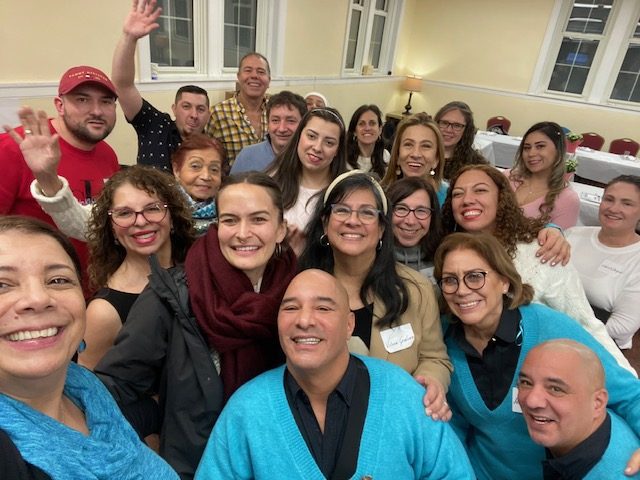East Boston’s ‘Noddle island’ has experienced several successive immigration waves over the last century, each contributing their unique cultural influences to the region. These waves originated from Ireland, Italy, Eastern Europe, and more recently, Latin America.
In recent years, Noddle island has drawn the interest of developers, leading to the upheaval of its diverse communities. As Luz Zambrano, co-founder of the Cooperative Center for Development and Solidarity (CCDS), explains, “immigrants that had built the neighbourhood are now getting displaced”.
When six families were displaced from an apartment building in the neighbourhood, Zambrano and her neighbours came together to develop solutions to the challenges presented by the area’s rapid gentrification. They wanted to find a way to economically empower the communities living in East Boston, so that they could continue to live there.
“Something came up in my head – my father was part of a co-operative in Colombia and I grew up in that system,” says Zambrano.
“We had education and health and everything through the co-op. My father was able to buy a house because the co-op loaned him the money for that. And so we had an incredible life growing up, and somehow that clicked in my mind.”

Many of Zambrano’s neighbours had similar stories of co-operation in their Latin American home countries, prompting them to put this knowledge into action to create CCDS in 2016. With a focus on developing worker co-ops, CCDS aims to promote sustainable social economic justice for its communities.
“Here in the United States, in particular here in Boston, when people talk about co-operatives, most of the time they’re talking about a business. For us, it is broader than just business,” says Zambrano.
“This is about changing the culture. This is about having equality and equity in our neighbourhood.”
CCDS began its work with an education programme, exploring capitalism and the solidarity economy, as well looking at why immigrant communities are being displaced, both from their home countries and their Boston neighbourhood.
“We really go deep into the root causes, and why co-operativism and solidarity economy is a real alternative, especially for immigrants and undocumented immigrants.”
From there, CCDS began to develop an ecosystem of co-ops, across a range of sectors including food, cleaning, fashion and childcare.
CCDS members were building on their existing skills and knowledge of co-operativism in a supportive environment, but one key challenge remained – many had come to the United States with limited English.

To overcome this hurdle, CCDS developed the Boston Immigrant Community Alliance (BICA) in collaboration with the East Boston Harborside Community School, the Mayor’s Office for Immigrant Advancement and English for New Bostonians (ENB). The programme, launched in 2019, was backed by a US$375,000 (£293,896) grant from Massachusetts General Hospital.

ENB has been supporting Boston’s immigrant communities with English for Speakers of Other Languages (ESOL) classes since 2001, and works with 20 ESOL providers to serve around 1000 adult learners each year.
BICA classes are based on ENB’s English for Immigrant Entrepreneurs Curriculum, which covers business planning, budgeting, marketing, customer service and safety.
“It has helped, because everybody who’s in the class is part of our ecosystem”, says Zambrano.
“Every member of each of the co-operatives that we work with has been part of the classes. Having people that already know each other, that already went through our institute and have a clear idea of what we’re doing and why we’re doing it, it’s reinforced in the class.”
ENB executive director, Claudia Green, explains that as an organisation focused on the economic mobility of immigrants, it was a “logical next step” to adapt the course for co-op owners, particularly given the long standing tradition of co-operativism in communities coming to Boston from Latin America.
“The great thing about English classes is that they can integrate many different kinds of content. So when we’re working with a community that includes limited English speakers, we say, okay, how do we take what’s important to you, and build that into an English class?”
Some BICA learners, including the Sazón Food Cooperative, put their new English skills into action at an event last December, where one member pitched Sazon to a panel of judges including city officials, an attorney, and a successful immigrant restaurateur.
“All of the judges just lit up when they heard Sazón’s presentation”, says Green. “My cursory sense is that there’s increased interest from the city in supporting co-operative businesses.”
As a result of the BICA collaboration, ENB is now in a better position to support the city’s move towards co-operation.
“What we’ve gained from BICA is the knowledge and experience from working in partnership with grassroots immigrant community leadership, and also how to adapt our existing model to meet co-operative community needs and interests.
“And now I believe that we have a curriculum and a process that could be used by other organisations that are promoting co-operative development in other geographic, economic, ethnic and linguistic communities.”
The project has also helped to increase CCDS’s visibility, enabling then to “push the envelope” of what co-operativism means to others, says Zambrano.
“For us, co-operativism is really an alternative for working class people, for poor people, or people who really want to do something and they don’t find a way in the capitalist system”, says Zambrano, later adding: “A lot of times here people treat solidarity economy and co-operativism like it’s something new. We had to go back and say no, natives in our countries have lived and have survived because of the solidarity economy, because of co-operativsm.
“This is not new. And the United States needs to learn from outside – they need to go out into the world and find out that this is older than any other economy that we have had.”
With the MGH Community Health Impact Funding coming to an end this year, the organisations involved are now seeking support to keep BICA going, including an application for state funding.
Green says that for ENB, “this is an essential part of our work – to be able to reach immigrant communities of very diverse backgrounds that wish to contribute to a Commonwealth that really values their voices and talents.
“To be able to adapt to the interests of immigrant communities is the priority for us, so we see this as a really great learning experience and something that we’re committed to continuing.”